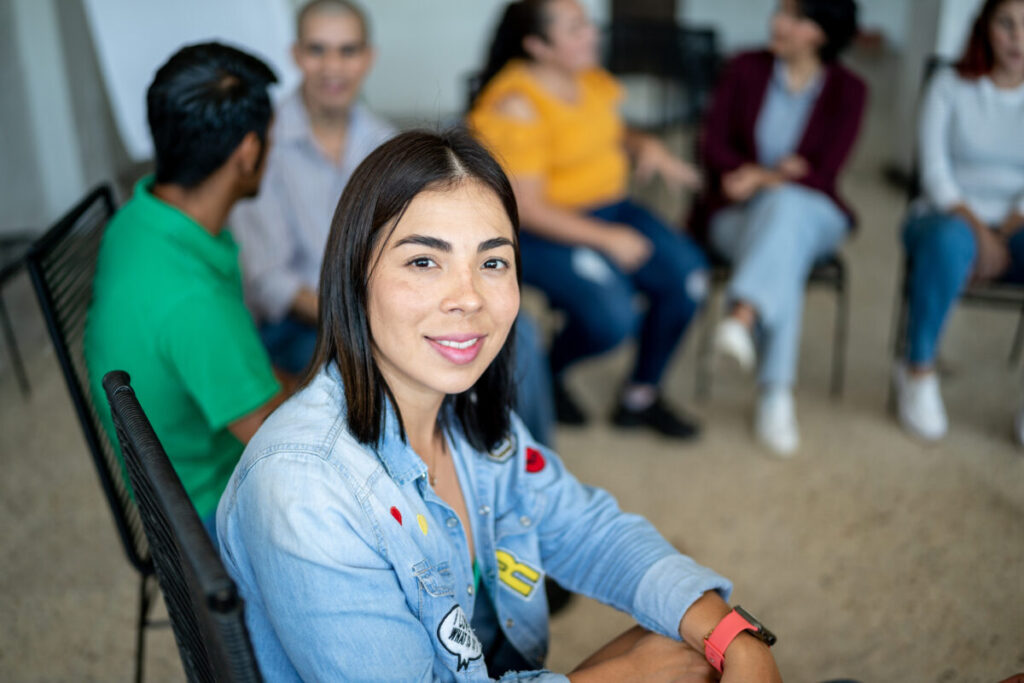Community Health Workers (CHWs) are recognized as trusted, front-line public health workers who provide and advocate for culturally informed care, carry out health education, and promote health in their communities. CHW associations, including the National Association of Community Health Workers (NACHW), have formed at state, regional, and national levels to represent and support the CHW workforce through professional support, connections, and a sense of professional identity for the workforce. As states increasingly look for new ways to engage communities and support the CHW workforce, CHW associations can serve as key partners in building and sustaining the CHW workforce as well as developing federal, state, and local policy impacting CHWs.
Building CHW capacity is at the leading edge of state approaches for addressing community-specific health priorities with the goal of improving the health outcomes in those communities. As such, developing meaningful partnerships with state CHW associations (or CHW networks where formal associations do not exist) can be a powerful tool for state leaders looking to improve community health through expanding community-level access to care, services, and supports. Through state-association partnerships, state officials can support two-way communication a between state leaders and CHWs, while supporting processes for obtaining meaningful CHW input and feedback in the development of policies such as Medicaid reimbursement mechanisms or implementing a CHW training or certification process.
To provide a forum for state leaders and CHW partners to explore how to expand effective partnerships, NASHP’s CWH State Policy Network hosted a multi-state exchange of best practices. The exchange featured dialogue between state leaders and CHW associations in Rhode Island and North Carolina, including the history of partnership and collaboration and key considerations for sustaining effective partnerships. Speakers and participants also discussed challenges, lessons learned, and the impact of the COVID-19 pandemic on the CHW workforce.
North Carolina
In some states, CHWs have been integral to a broader conversation about health workforce sparked by the COVID-19 pandemic. CHWs have been key players in pandemic response and effective community engagement strategies to advance health equity.
North Carolina leveraged a pre-pandemic planning process led by the North Carolina Department of Health and Human Services (NCDHHS) and the North Carolina CHW Advisory Committee — a group that included state officials as well as a diverse group of CHWs that would later become the North Carolina CHW Association (NCCHWA) — to direct investment of CARES Act and American Rescue Plan funds to hire CHWs in pandemic response across the state. CHW involvement in the response included contact tracing, coordinating with local health departments, providing vaccine education, facilitating vaccination via appointments and community-based events, and connecting people to social support resources. By July 2021, the CHW workforce had expanded to all 100 counties via 8 different vendors that recruit, train, and manage CHWs. Based on the success of this program, NCDHHS and NCCHWA received a 3-year COVID Response and Resilient Communities (CCR) CDC 2109 grant allowing statewide partners to develop an infrastructure to train, deploy, and engage CHWs. While CHWs were working in North Carolina prior to the pandemic, the COVID-19 crisis, along with subsequent investments in CHWs, rapidly deepened the partnership between the state and NCCHWA.
The partnership between NCDHHS and NCCHWA has also facilitated the expansion of CHW training opportunities and the establishment of core competencies for CHWs. The standardized core competency training (SCCT) is grounded in the community college system — something that was requested by the CHW workforce in the state — with courses currently offered across twelve institutions within the state. SCCT benefits from NCCHWA oversight and use a “train-the-trainer” model to help disseminate best practices for conducting trainings. In early 2022, NCCHWA launched a certification process for CHWs completing the standardized core competency training with further levels of certification and specialization under development. One facet of these programs is to establish the CHW profession as a sustainable career path with additional plans underway to develop sustainable funding mechanisms that include Medicaid.
Rhode Island
In Rhode Island, the Rhode Island Department of Health (RIDOH) provided funding that helped develop Community Health Worker Association of Rhode Island (CHWARI), which supports community health workers in professional development, mentorship, advocacy, and networking. CHWARI offers comprehensive CHW trainings including core CHW competency training, chronic disease management, race equity, social justice, and healthy aging. CHWARI assists RI’s CHWs in accessing certification through the Rhode Island Certification Board. In developing CHWARI, the state envisioned a strong association that could support CHWs in training, role definition, advocacy, and expansion. The state recognized early on the essential role of the association to advance CHW workforce in Rhode Island.
Rhode Island presenters shared the process of establishing CHWARI and the strategic alignment with other community health and health equity efforts in the state. Starting in 2009, RIDOH — using funds from the federal Department of Health and Human Services (HHS) Office of Minority Health — provided seed money for the association to hire an executive director, organize volunteers, and develop a web presence. More recently, RIDOH and CHWARI submitted joint grant applications to the Department of Labor and Training and accessed workforce development funding in 2017. Rhode Island’s CHWs play an integral role in the state’s health equity strategy, including in the state’s Heath Equity Zones (HEZs) — a collaborative, community-driven initiative to identify and address community needs and implement place-based solutions that address social drivers of health. CHWARI support CHWs in the state through planning trainings, providing a space for convenings and exchange and helping to establish the value of CHWs in the health and health-related systems. Representatives from both the state and CHWARI discussed the opportunities and challenges of partnership. CHWARI is housed within the Rhode Island College Institute for Education in Healthcare, a structure that provides infrastructure and security for the association, but requires coordination and process alignment across multiple stakeholders, including state agencies, the College, and CHW organizations. The shared vision for collaboration provides the impetus for strong collaboration and helps facilitate the needed alignment of timelines and resources. RIDOH and CHWARI both support the organizing and convening function of CHWARI — which brings together partners that include state agencies as well as other organizations — as this function offers opportunities to inform policy across the state. CHWARI also serves as a hub of all things CHW: advertising training opportunities, job postings, networking events.
New federal resources have aided in the expansion of CHW efforts in Rhode Island and have reinforced partnerships between CHWARI and the state. RIDOH received Community Health Workers for COVID Response and Resilient Communities (CCR) CDC 2109 Component B grant funding and subcontracted with CHWARI to enhance training capacity. Rhode Island was also one of five states selected for the CCR CDC 2109 Component C funding to build a sustainable, long-term approach for CHW programs. Additionally, the Executive Office of Health and Human Services Health Systems Transformation Project issued a funding opportunity, Rhode to Equity, that will “provide 6 cross-sector teams, with an HEZ as the project lead, the opportunity to test and evaluate strategies that will build leadership and operational capacity for clinical-community linkages, and enhance place-based initiative’s ability to improve both health and social outcomes.” The HEZ teams will include CHWs.
Incorporating community voices in designing the future of public health
Across the country, the COVID-19 pandemic has ignited a conversation about how to shore-up, grow, and modernize the healthcare and public health workforces. As governors across the country laid out policy visions in annual state of the state addresses, governors in 20 states highlighted plans to address existing health workforce shortages and enhance recruitment and retention — a sharp increase from the 8 governors that discussed workforce in their 2021 speeches. The pandemic has also highlighted the ongoing inequities present in the United States health system. Although the public health system has been challenged by the COVID-19 pandemic, this has served as an opportunity to look toward more equitable models for the future that center community voices and invite all stakeholders to the table. With the increased focus on workforce, strong partnerships between state officials and CHW associations, which include concrete shared goals and mutual trust, can provide one avenue for strengthening state and community connections. To learn more about state policies related to the CHW workforce, see NASHP’s 50-state map.
Key components of partnership between states and CHW associations
Rhode Island and North Carolina speakers identified a number of key ingredients for partnerships between state policymakers and CHW associations to succeed. These included:
- Mutual respect for partners’ priorities and interests, as well as being understanding, open, and transparent about other priorities
- Vulnerability, trust, transparency, and strong communication, all of which create a safe space where everyone can be heard and respected
- Commitment to the “long game” and a focus on how to enhance community health in the long-term
- Leadership and champions at the state and association levels who help drive the work forward
- A shared vision and a clear idea of the end goal
- Other partnerships — everyone has resources and connections to bring to the table that can help support and sustain CHWs
NASHP would like to thank the roundtable speakers who provided information for this blog, including state officials from North Carolina and Rhode Island, and representatives from NCCHWA and CHWARI.
Support for this work was provided by the Robert Wood Johnson Foundation. The views expressed here do not necessarily reflect the views of the foundation.




